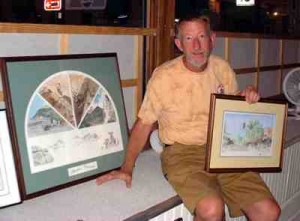Essay by John Clayton
Rural Life – October 2005 – Colorado Central Magazine –
OUR SMALL TOWN has just suffered a profound loss: the departure of our treasured UPS deliveryman.
Like Santa Claus, Tony always brought us treasures. The regular mail might bring bills or junk, but Tony’s brown truck always meant a package. Along with telephone, television and Internet, Tony was our link to the outside world. But while most such links are technological, Tony was the link with the human face. He was the smiling personification of a global economy. That made him someone important in town, a guy that everybody knew, a shared currency even more ubiquitous than Paris Hilton.
Though I speak of him in the past tense, he’s still alive and happy. He took a promotion, to a shorter route closer to his home. But his departure comes as a blow around here. He’s been such a part of our community that it’s hard for us to realize he even has a home somewhere else.
At about 2,000 residents, our town is just big enough that you don’t wave at absolutely everybody who drives past. You want to make sure you recognize them first. But everybody recognized Tony, and vice versa. A local paper interviewed him at his departure, and he tried to reassure us: “I’ll still wave if I see you.”
It’s not just his face we’ll miss; it’s his knowledge of the community. With 13 years delivering packages in the same town, he knew our intimate likes and dislikes. He knew where to deliver without a signature. He knew who preferred packages at the front vs. the back door.
He even knew P.O. box numbers. Our town is so small that the Postal Service doesn’t offer home delivery — we all go to the post office to get mail out of a P.O. box. (It’s a great community ritual, but also job security for Tony: We prefer big packages home-delivered by UPS, so we don’t have to lug them home from the post office.) Yet even for packages addressed just to a name and P.O. box, Tony could consult a delivery/address database in his head. His skills were so great that I considered suggesting a change to one of the company’s oft-uttered policies: “UPS does not deliver to post office boxes — except in Tony’s territory.”
I even got a sense that Tony knew things about our lives: When I was getting lots of official-looking documents, that meant I must be nearing a deadline; when someone else was getting lots of toys, he or she must have just gotten a raise. My wife and I should have invited him to our wedding, which was a symbolic ritual only slightly greater than the first package he delivered to her new name and address.
And the thing about Tony was that he was so friendly and accommodating. One day, he was delivering a package to a friend of mine while I was visiting. When he saw me, he said, “I’ve got something for you in the truck. Do you want it now?” He’d deliver other packages to people walking down the street, or ask if they’d be home in half an hour.
Tony even gave some customers his cell phone number (though he later admitted regretting it). In the middle of the day he’d get calls on his cell: “Can you meet me at such-and-such?”
Sharing community ritual is one of the benefits of small-town life. We may not have many restaurants to choose from, but our lives are tightly interwoven. In the city, a UPS driver might be a dependable presence and even an admirable character, but if you described him to friends at a Friday night party, they would recognize only the type. “Yeah, I like my UPS driver too.” In a small town, it’s: “Oh, Tony! Isn’t he great!”
I suppose there could be bad UPS drivers too. We would share those stories as well, and wouldn’t enjoy the experience. That’s part of why we’re so sad to lose Tony.
But I’m encouraged about the future. I was walking down the street last week and saw Tony’s replacement knocking on a friend’s door. “I think she’s out of town,” I called out to him.
He asked back, “This is the woman who has the café, right?” I nodded. “The café was closed,” he explained, “so I figured she’d want her package at home.”
John Clayton is a contributor to Writers on the Range, a service of High Country News in Paonia, Colorado (hcn.org). He lives and writes in Red Lodge, Montana.

